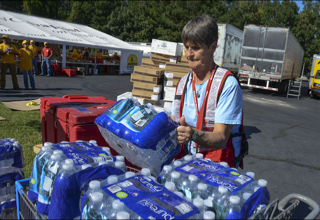Hurricane Matthew in the U.S.
The devastating effects of Hurricane Matthew are still causing great suffering in several states, including North Carolina, where deadly floods have cut off entire communities. The American Red Cross remains on the scene providing shelter, meals and relief supplies to those in great need. On Thursday morning more than 3,200 people in North Carolina, South Carolina, Georgia and Florida woke up in 61 Red Cross and community shelters. Rivers remain at record flood levels, and some aren’t expected to crest until later this weekend. Our work is just beginning. Below is a situational update of Hurricane Matthew’s impact on the United States Southeast and our Red Cross response.
Situational Update:
- U.S. officials are reporting damage of at least $6 billion, making Matthew the costliest hurricane since Sandy in 2012.
- Flooding is expected to peak in the next 24 hours in five counties: Edgecombe, Pitt, Bladen, Wayne and Lenoir. The Tar River is currently cresting.
- Evacuations continue in the area around the Woodlake Dam in Moore County.
- Transportation remains a major issue. Interstate 95, a major East Coast artery, is still closed from Lumberton to Fayetteville. I-40 near Newton Grove remains closed and U.S. 70 in Kinston is now closed.
Domestic Response:
The American Red Cross has mounted a massive sheltering operation across the East Coast to help individuals and families impacted by Hurricane Matthew.
- More than 3,200 people in North Carolina, South Carolina, Georgia and Florida woke up on Wednesday morning in 61 Red Cross and community shelters.
o In North Carolina, 39 shelters were open on Wednesday which provided refuge for more than 2,600 people.
o In South Carolina, 14 shelters were open on Wednesday night with more than 400 people.
o In Georgia, 4 shelters were open on Wednesday night with more than 100 people.
o In Florida, 4 shelters were open on Wednesday night with 40 people.
- In total, the Red Cross has mobilized more than 4,100 disaster workers, 200 response vehicles—more than half of our total vehicle fleet—and more than 100 trailers filled with water, ready-to-eat meals, cots, blankets, kitchen items, cleaning supplies, comfort kits, insect repellant, gloves, masks, shovels, rakes, coolers and more.
- Red Cross and community partners have served more than 387,000 meals and snacks, distributed over 56,000 relief items, and provided more than 82,000 overnight stays in shelters.
- As conditions permit, Red Cross response vehicles will begin circulating through the hardest hit areas to begin delivering food and relief supplies.
- More volunteers, vehicles and supplies are being mobilized now to supplement relief efforts.
Accounts from the Ground:

Tara Davis (pictured above with a Red Cross worker) was outside her home Lillington, N.C., on Saturday as the winds from Hurricane Matthew came through. “I looked at my husband, and said, ‘that power pole is going to fall.’ The pole fell and ripped out the plumbing under the house. My brother came and helped us get our animals out.” Tara’s husband and father are also at the shelter, and their four dogs and two cats are staying at the Cumberland Animal Shelter to stay safe from the flooding. Tara added, “The Red Cross has helped me tremendously. When I came inSunday after staying up all night, they knew I was exhausted. They offered us food, and have been very welcoming.” Photos by Daniel Cima for the American Red Cross

Preparing to deliver thousands of meals and drinks is no small business, and Red Cross volunteers from around the country gather and work together to stock emergency response vehicles with meals and water to bring to the many communities around Fayetteville, N.C. In many cases,both power and water service have been lost, and residents are hungry, exhausted, and in need of hot food and water. In the wake of Hurricane Matthew, and in spite of continuing high flood waters, the weather has been sunny and hot during the day, and drinking water is critical. Gail Combs-Tannze (pictured above) of Howell, Michigan, has been a Red Cross volunteer since 2005. “Katrina was my first disaster, then Ike and Gustav. I then went to Blood Services as a coordinator. There was a need, and I knew it was what I wanted to do.” Gail said that in volunteering with the Red Cross, “My work is fulfilling and it gives me a sense that I’m actually helping people.” Photos by Daniel Cima for the American Red Cross

Red Cross volunteer David Kingsbury gets help serving sandwiches to shelter residents from Jared Worthington, Edgewood Elementary School Principal. Jared shared, “We’ve had people come in here who have nothing-no power, no water, and they are still asking ‘what can we give?” Jared added that relief efforts are truly a community effort, as local teachers, firefighters and police officers have assisted the sheltering and feeding operation in Whiteville, N.C.
Safety Messaging:
In North Carolina and South Carolina, severe flooding continues to be a major concern now and in the coming days. Please visit the Flood Safetypage on the Red Cross website for a comprehensive list of safety and preparedness information, and follow the below instructions if you are impacted by severe flooding:
- Listen to area radio and television stations and a NOAA Weather Radio for possible flood warnings and reports of flooding in progress or other critical information from the National Weather Service (NWS)
- When a flood or flash flood warning is issued for your area, head for higher ground and stay there.
- Stay away from floodwaters. If you come upon a flowing stream where water is above your ankles, stop, turn around and go another way. Six inches of swiftly moving water can sweep you off of your feet.
- If you come upon a flooded road while driving, turn around and go another way. If you are caught on a flooded road and waters are rising rapidly around you, get out of the car quickly and move to higher ground. Most cars can be swept away by less than two feet of moving water.
- Keep children out of the water. They are curious and often lack judgment about running water or contaminated water.
- Be especially cautious at night when it is harder to recognize flood danger.
You can also stay informed by downloading the free Red Cross Emergency App which puts real time information and hurricane safety tips at your fingertips. The Emergency App is available in app stores by searching for the American Red Cross, texting GETEMERGENCY to 90999 or going to redcross.org/apps.
Hurricane Matthew in the Caribbean
Haiti Situational Update:
- More than 2 million people across the Caribbean have been impacted by Hurricane Matthew.
- Various sources are reporting a mounting death toll in Haiti, which suffered the worst damage in the Caribbean. The United Nations’ Office for the Coordination of Humanitarian Affairs (OCHA) reports more than 300 deaths, with other sources indicating the count could be over 1,000.
- OCHA is also reporting that more than 175,000 people have been displaced and more than 1.4 million people are in need of immediate assistance.
- Approximately 80% of homes are damaged in the southwest. There is major flooding in 11 communes as well as widespread damage to the infrastructure.
- Cholera was a pre-existing issue in Haiti prior to Matthew. Now, the hurricane’s impact on water and sanitation infrastructure is reportedly causing the disease to spread further in Hurricane-affected areas.
- Primary concerns in Haiti remain:
o Fighting the spread of cholera due to flooding;
o Reaching injured people with medical care;
o Performing search and rescue;
o Providing shelter to those who have been displaced; and
o Restoring livelihoods.
American Red Cross Response:
- In order to ensure that the response can continue to ramp up quickly, the ARC has committed additional resources to support emergency operations focusing on relief, health and care, water, shelter, sanitation and hygiene promotion.
- The American Red Cross has also deployed seven Disaster Response Specialists to assist the IFRC, Haitian Red Cross, and ARC delegation in Haiti with emergency operations.
- More than 24,000 mosquito nets from the ARC warehouse in Panama have been shipped to the operation to help combat mosquito-borne diseases.
- Three teams in Haiti made up of the more than 200 delegation staff that pre-deployed throughout the affected areas are beginning damage assessments and distribution of relief supplies. In an effort to mitigate the spread of cholera as a result of the floods, the American Red Cross has completed an initial distribution of 1000 hygiene kits and 600 cholera-prevention kits. Additional relief supplies such as water purification products, shelter kits and mosquito nets are being procured locally and internationally.
- The delegation staff are also directly engaged with the Haitian Red Cross branches in the South, West, and Northwest departments, providing technical, logistical and financial support.
- Generators and VSATS which provide high speed, broadband satellite communications for internet or private network communications have been deployed.
- To facilitate communication between family members, the Red Cross Restoring Family Links program has activated the Family Links website where individuals can register missing persons, register themselves as safe and search a database of other registered persons.
- ARC staff are supporting the operation remotely with Information Management and Geographic Information System (IM/GIS) support. The maps generated will help identify priority areas for the relief operation and identify vulnerable communities.







Leave A Comment